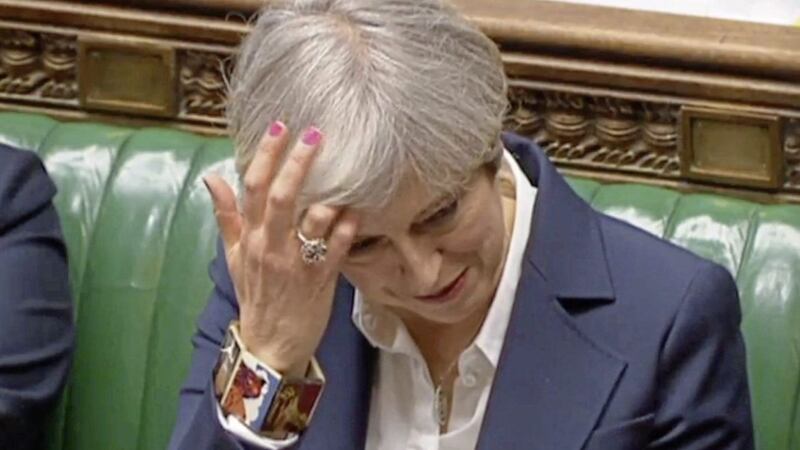After last June’s referendum result, Brexit was being described as a tightrope for British prime minister Theresa May – a policy imperative that demanded careful handling and finely measured footwork.
As of last week, it now looks more like a rope bridge, with Ms May and Britain’s constitutional future suspended dangerously above the choppy waters of disaster.
At one end of the Brexit rope bridge, Ms May is now standing face-to-face with European Council president Donald Tusk. He boasts the expansive breadth and depth of European institutions and states right behind him. Mr Tusk is the one on dry land. (And power trumps trust in the EU.)
At the other end of the rope bridge, Scotland’s first minister Nicola Sturgeon is busy unravelling all of the United Kingdom’s constitutional knots, against the ever-present backdrop of the north’s contested constitutional status. Again, Ms Sturgeon is the one standing on solid, dry land. And her agenda is gathering, what US politics calls, the ‘big mo’ – momentum.
Meanwhile, circling overhead are two large vultures timing their swoops with determined self-interest. One is China - which would like to virtually own the whole bridge; the other is Russia - which just enjoys making the bridge wobble.
The strategic difficulty for British negotiators is this: they can’t begin dismantling the Brexit constitutional rope bridge from the middle, and they can’t finish the job without trusted helpers on dry land.
Ms May’s biggest challenges now are timing and sequencing. Having triggered Article 50, the two year countdown has begun. Barring unforeseen calamity or humiliating climb-down, Britain must withdraw from European arrangements in 24 months.
As long as Brexit remained a bubbling background threat, Britain held considerable strategic negotiating leverage with the EU. However, the timebound inevitability of Brexit now significantly weakens Westminster’s position.
That new reality started with Ms May’s letter to the EU on last Wednesday. It stated that Brexit is intended “to restore, as we see it, our national self-determination”. Yet it went on to recognise the need for special circumstances regarding Ireland – specifically here in the north.
That’s not just about practicalities such as customs and tariffs. It’s also because - uniquely within British constitutional law - Westminster is required to legislate for the secession of this state’s territory when a majority of local voters so decide.
Ms May’s letter was followed by Mr Tusk’s reply. Again this recognised Ireland’s “unique circumstances” and favourably insisted that “flexible and imaginative solutions will be required” for the north. So far, so focused.
Increasingly, the logic of a de facto ‘two states, one system’ solution on the island of Ireland is strengthened, particularly in relation to economic arrangements. This would require enhanced Irish-British joint administration though not necessarily joint authority (along with some EU role).
The third letter last week was Ms Sturgeon’s. She focused on Scotland’s own “right of self-determination” for a second independence referendum, in the sure knowledge that Ms May’s denial of that option will now only aggravate Scottish demands. A win-win.
So even within the United Kingdom framework, the exercise and understanding of “self-determination” is neither national nor uniform. That fact highlights just one ounce in the vast tonnage of Brexit’s internal contradictions and challenges.
The fundamentalist pro-Brexit view is that Britain can now succeed entirely independently as a senior global player, while singularly controlling its own laws and frontiers. It’s a 19th century mindset for a 21st century reality. Britain risks becoming an island of isolationism in a world of interdependence. On any objective level, that is retrograde: forcing reality into reverse.
In any relationships – business, politics, social, personal – the keys to sustainable partnerships lie in the open integrity of mututal motivations and shared values. Self-centredness simply isolates the protagonist, often creating bigger, long-term intrinsic dilemmas. And blinkered thinkers always miss the big picture. They foolishly focus on perceived short-sighted gain (and gamble) while ignoring the prize of long-term growth.
Sir Ivan Rogers, who resigned in January as Britain’s ambassador to the EU, has talked with insight of “ill-founded arguments and muddled thinking”. And he’s highlighted that – contrary to the expertise in the EU – “serious multilateral negotiating experience is in short supply in Whitehall”.
The negotiations of the next two years will determine Britain’s development for the next two generations – at least 40 years. So today’s school-leavers across these islands will spend their entire lifetimes picking up the pieces of Brexit’s constitutional, economic, cultural and social upheaval. We can only hope that some of them learn a thing or two about decent bridge building along the way.








